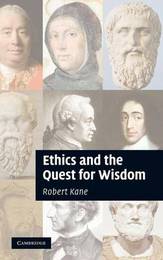
|
Ethics and the Quest for Wisdom
Hardback
Main Details
| Title |
Ethics and the Quest for Wisdom
|
| Authors and Contributors |
By (author) Robert Kane
|
| Physical Properties |
| Format:Hardback | | Pages:298 | | Dimensions(mm): Height 231,Width 155 |
|
| Category/Genre | Ethics and moral philosophy
Social and political philosophy |
|---|
| ISBN/Barcode |
9780521199933
|
| Classifications | Dewey:170 |
|---|
| Audience | | Professional & Vocational | |
|---|
|
Publishing Details |
| Publisher |
Cambridge University Press
|
| Imprint |
Cambridge University Press
|
| Publication Date |
12 August 2010 |
| Publication Country |
United Kingdom
|
Description
Modernity has challenged the ancient ideal of a universal quest for wisdom, and today's world of conflicting cultures and values has raised further doubts regarding the possibility of objective ethical standards. Robert Kane refocuses the debate on the philosophical quest for wisdom, and argues that ethical principles about right action and the good life can be seen to emerge from that very quest itself. This book contends that the search for wisdom involves a persistent striving to overcome narrowness of vision that comes from the inevitable limitations of finite points of view. When applied to questions of value and the good life, this striving has ethical implications about the way we should treat ourselves and others. This study argues for the merits of this central thesis against alternative theories in contemporary normative ethics, and discusses its practical applications for social ethics, political philosophy, law and moral education.
Author Biography
Robert Kane is University Distinguished Teaching Professor of Philosophy Emeritus and Professor of Law at the University of Texas at Austin. He is the author of seven books including Through the Moral Maze (1994), The Significance of Free Will (1996) and A Contemporary Introduction to Free Will (2005), as well as over sixty articles.
Reviews'This book is bold and ambitious. It is full of original ideas, which it seeks to integrate, by means of careful argument, with more familiar moral notions. It is, for many reasons, a most welcome addition to the literature.' Richard Kraut, Northwestern University 'Modernity has left us with a world where we are uncertain about what values to hold and how our lives should be lived. Kane's work provides us with the most imaginative and compelling response to these challenges in years. This is one of those rare works where you sense you are being guided through new terrain by a learned and wise soul.' Mark Bernstein, Purdue University 'An exciting and ambitious book. Kane introduces and defends a complete ethical theory that represents a genuinely novel approach to normative ethics. His overriding theme is that moral constraints flow from the search for wisdom in an ancient philosophical sense ... The book is valuable not only for the novelty and promise of its central ideas, but also for its clear exegesis of other important positions.' Alexa Forrester, Notre Dame Philosophical Reviews '[This] book is bold, ambitious and merits careful study. [It] contains a sustained argument for a meta-ethical and normative theory that contains a theory of right action and a theory of the good life, a unified conception of practical and theoretical reasoning, a survey of the main theories of normative ethics and an account of the application of his theory in political philosophy, applied ethics, philosophy of law, feminist ethics and moral education. Kane's ethical theory synthesizes elements of ancient eudaimonism, Kant's moral theory and Mill's classical liberalism.' Journal of Moral Philosophy 'This book is a rare thing: a monograph that is accessible. It brings together a number of central ethical theories, clearly presented, and discusses their advantages and shortcomings in the light of the new theory of the book. The author takes care to illustrate the theories he discusses with vivid examples drawn from both the ethics literature and general culture.' The Philosophical Quarterly 'Kane carefully addresses a large number of topics, including both the right and the good, as well as meta-ethical issues about objectivity, within the compass of a single theory ... This is a significant accomplishment from which there is much to learn, both in its overall argument and in its detailed discussions.' Ethics
|